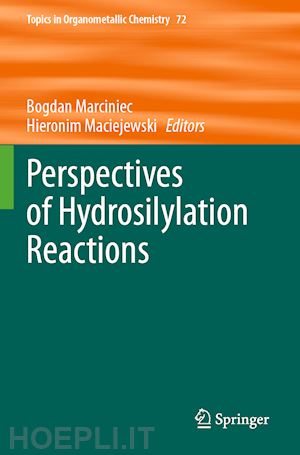
Questo prodotto usufruisce delle SPEDIZIONI GRATIS
selezionando l'opzione Corriere Veloce in fase di ordine.
Pagabile anche con Carta della cultura giovani e del merito, 18App Bonus Cultura e Carta del Docente
This volume describes the latest advances and perspectives in hydrosilylation, with a focus on new organometallic catalysts and their mechanistic aspects. Hydrosilylation is the reaction of =SiH with carbon-carbon, carbon-heteroatom or heteroatom-heteroatom bonds and is the most fundamental and elegant method for laboratory and industrial synthesis of organosilicon molecular and macromolecular compounds. Yet these reactions do require a catalyst, for which initially homogeneous noble metal catalyst, mainly platinum, rhodium, iridium or ruthenium were used. However the high prices, metallic residues of these valuable catalysts as well as issues with product purification, did increase the interest in developing new catalysts. Noteworthy in this regard are the recently developed hydrosilylation reactions using catalysts based on earth-abundant transition metals (for example Mn, Fe, Co, Ni) and heterogeneous catalysts presented here.
This volume of Topics in Organometallic Chemistry is written for scientists interested in silicon chemistry and its catalytic aspects, but can also be used as valuable handbook for postgraduate and advanced undergraduate students working with organometallic chemistry, catalysis as well as synthesis of fine chemicals.
Silicometallics vs. Organometallics and Catalysis – General Guidelines.- Recent Advances and Applications of Group 10 Transition Metal Hydrosilylation Catalysts.- State of the Art in Rhodium and Iridium Catalyzed Hydrosilylation Reactions.- Recent Development of Cobalt-Catalyzed Hydrosilylation Reactions: New Catalysts, Mechanistic Understandings and Future Trends.- Iron and Manganese Catalysed Hydrosilylation Reactions.- Catalysis of Hydrosilylation Processes with the Participation of Ionic Liquids.- Hydrosilylation Catalysis for One-pot Synthesis.- Hydrosilylation of Carbon—Carbon Multiple Bonds in Organic Synthesis.
Professor Bogdan Marciniec, received M.Sc. (1963), Ph.D. (1970) and D.Sc. (1975) from the Adam Mickiewicz University, Poznan, Poland. He is a member of the Polish Academy of Sciences (1994), member of European Academy of Arts, Sciences and Humanities (2009) and doctor honoris causa of the Technical University in Lódz (Poland) as well as President of the Adam Mickiewicz University (1988/1990). He was a postdoctoral associate with Prof. R.C. Schowen, Kansas University (1970/1971) and he founded (the first in Poland) Poznan Science and Technology Park (Director 1995-2015).
His research activity is focused on the organosilicon chemistry and catalysis by organometallic and inorganometallic compounds. Synthesis and reactivity of organic derivatives of silicon but also containing B, Ge, Sn, and other metalloids mainly in the presence of transition metal complexes are of particular interest. Properties and application of organosilicon compounds are widely studied.
Professor Marciniec supervised 43 Ph.D Thesis and is an author or co-author of over 470 publications (cited over7,000 times with h-index 38), 200 patents, 11 licenses and 42 technologies as well as 25 book chapters. He is also editor and co-author of 15 books, including “Comprehensive Handbook on Hydrosilylation” (Pergamon Press, 1992), which is considered as the “Bible of hydrosilylation” as well as “Hydrosilylation. A Comprehensive Review on Recent Advances“ (Springer, 2009).
He is a member of Advisory Boards of International Symposia - International Symposium on Organosilicon Chemistry (1993), International Symposium on Olefin Metathesis and Polymerisation (1993), European Silicon Days (2000) and International Symposium on Homogeneous Catalysis (2008-2012). He was a Chairman of the Xth International Symposium on Organosilicon Chemistry - Poznan (1993), 16th International Symposium on Olefin Metathesis - Poznan(2005) and the 17th International Symposium on Homogeneous Catalysis Poznan (2010) as well as the 8th European Silicon Days Poznan (2016). He presented 100 invited lectures during international symposia and in scientific institutes and universities of 25 countries.
Professor Hieronim Maciejewski, received M.Sc. (1986) from Poznan University of Technology, Ph.D. (1995) and D.Sc. (2005) from the Adam Mickiewicz University in Poznan. He was a postdoctoral associate with Prof. M.F. Lappert, The University of Sussesx (1997/1998). Since 1998, he has also been the manager of the Incubator of Chemical Technologies at Poznan Science and Technology Park, Adam Mickiewicz University Foundation. Currently, he is the director at Poznan Science and Technology Park and the president of the Board of AMU Foundation. He is also the head of the Department of Chemistry and Technology of Silicon Compounds at the Faculty of Chemistry, Adam Mickiewicz University inPoznan. His scientific interests include synthesis, properties, and applications of organofunctional silicon compounds and their derivatives, both molecular (silanes and silsesquioxanes) and polymeric (polysiloxanes) ones, as well as catalytic processes of synthesis of the above compounds, in particular using catalysis in ionic liquids. Prof. H. Maciejewski is a co-author of 45 technologies for silicon compounds syntheses, an author or co-author of over 200 publications in international specialized journals, 98 patents and patent applications, a co-author of 1 book and 12 chapters in English concerning hydrosilylation.











Il sito utilizza cookie ed altri strumenti di tracciamento che raccolgono informazioni dal dispositivo dell’utente. Oltre ai cookie tecnici ed analitici aggregati, strettamente necessari per il funzionamento di questo sito web, previo consenso dell’utente possono essere installati cookie di profilazione e marketing e cookie dei social media. Cliccando su “Accetto tutti i cookie” saranno attivate tutte le categorie di cookie. Per accettare solo deterninate categorie di cookie, cliccare invece su “Impostazioni cookie”. Chiudendo il banner o continuando a navigare saranno installati solo cookie tecnici. Per maggiori dettagli, consultare la Cookie Policy.